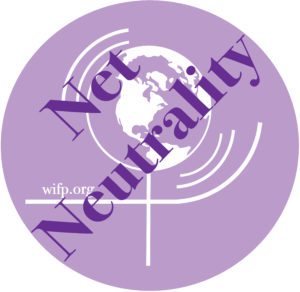Dr. Donna Allen’s Life Work
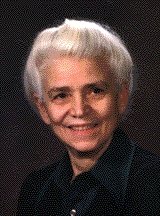
Donna Allen, born August 19, 1920, would be 100 years old if she had lived this long. Donna, who founded the Women’s Institute for Freedom of the Press in 1972, had a remarkable ability to analyze issues, to articulate that analysis, and to transform her ideas into practice.
For Donna, the most important issue to address was how to develop a viable communication system in which all people have the opportunity to speak for themselves, reaching the widest possible audience. Equality of outreach is a crucial element of media democracy. If some people (or conglomerates) can reach the majority of the population out of proportion to other voices, this power imbalance can make it difficult, if not impossible, to have a true democracy.
Currently in the U.S. just five conglomerates reach over 90% of the population. The majority of the people in the U.S. have no means to get their information out to that many people to counter such power.
These issues drove Donna to examine the current media system and formulate ideas about what is needed in order to truly develop a communications structure where everyone who chooses to, can communicate their information, perspectives, and ideas relatively equally. Her recognition that media democracy specifically is critical for true democracy and for justice for everyone. She developed a media philosophy to aid us in that direction. Her life of activism helped her see what needs to be done for a radical restructuring of the communications media in order to obtain media democracy.
Donna Allen’s Early Activism
Donna, an economist and author, had an intelligence that analyzed what was going on around her and motivated her to activism. In 1947, Donna did support work in the Chicago area for Highlander Folk School of Monteagle, Tennessee, a pioneering effort in integration and education of Southern workers, and drove down to Highlander in July of that year. She was active in the Progressive Party.
Donna was deeply involved in the field of labor relations. She did economic research for various trade unions, including the American Federation of Labor Metal Trades Department. As an employee of the National Labor Bureau in 1948 she did research for the Railway Brotherhoods. In 1949, having been appointed by President Truman to the Presidential Emergency Board, she heard emergency cases in industrial relations.
From 1953 through 1955, Donna taught at Cornell University’s School of Industrial and Labor Relations. Her political activism intensified during this time. Donna worked passionately on the campaign to defend the innocence of Ethel and Julius Rosenberg and to prevent their execution as spies. In 1953 she worked against the Central Intelligence Agency involvement in overthrowing the newly elected government in Guatemala. Donna also became active in the League of Women Voters’ Freedom Agenda Study Project. She participated in its workshops on such topics as government loyalty oaths and freedom of expression.
After moving to Washington, DC, Donna took her children to join her in demonstrations against the Pentagon to prevent the U.S. from trying intervene in the Cuban revolution, threatening invasion. She also involved her children in picketing the DC area amusement park, in Glen Echo that did not admit black families. The demonstrations were effective in opening up the park in 1961.
Peace and Disarmament
Peace and nuclear disarmament were of prime importance to Donna. In 1959 she began working with the Women’s International League for Peace and Freedom (WILPF) and the National Committee for a Sane Nuclear Policy. She joined their efforts to inform the public how dangerous nuclear weapons build policies were, and how crucial it was to prevent the spread of nuclear weapons. She became a member of the national Legislative Committee of WILPF and later served as the committee’s chair, as well as being a member of the WILPF National Board.
In 1960 she joined the staff of Vermont Congressman William H. Meyer to assist in the fight he had initiated in Congress against extension of nuclear weapons to Germany. She also worked on his campaign for re-election, writing campaign brochures and fliers, and even made a trip to Vermont to explain the congressman’s votes on the nuclear issues.

In the fall of 1961 when the United States and the Soviet Union ended their moratorium and resumed nuclear testing in the atmosphere, Donna was among those who founded Women Strike for Peace (WSP), an organization that began with a national protest by women on November 1, 1961. Donna led the delegation that day to the Soviet Embassy in Washington, DC. Another delegation led by Dagmar Wilson of WSP in Washington went to the White House.
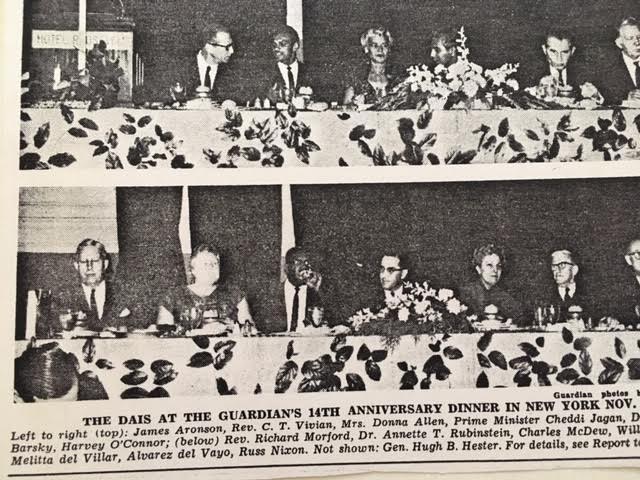
She is seated between Rev. C.T. Vivian and Prime Minister Cheddi Jagan
To combat the efforts made to silence First Amendment freedoms of speech, press, assembly, and petition, in 1961, Donna helped to organize a local Washington Area Committee to Abolish the House Un-American Activities Committee.
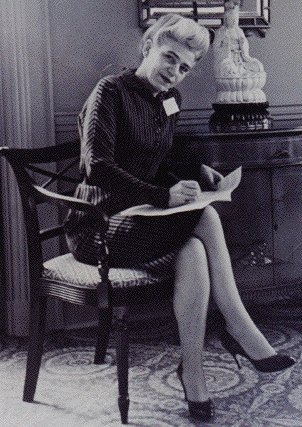
Between 1961 and 1964, Donna, who had an MA in economics, wrote about the economics of disarmament. She was a delegate to the annual meeting of WILPF in 1962. She testified before Congress and at national and international conferences, such as the International Arms Control and Disarmament Symposium in Ann Arbor, Michigan, in January 1964, and in December 1964 at the Conference on Economic Aspects of Disarmament in Vienna, Austria. After the Vienna conference, she went to Paris, France, where she joined a 15-nation European demonstration against a nuclear North Atlantic Treaty Organization and was arrested. She and the others who were arrested spent some six hours in a French jail. She spoke at that evening’s rally, sharing the spotlight with Eve Curie and other notables, before an audience of thousands.
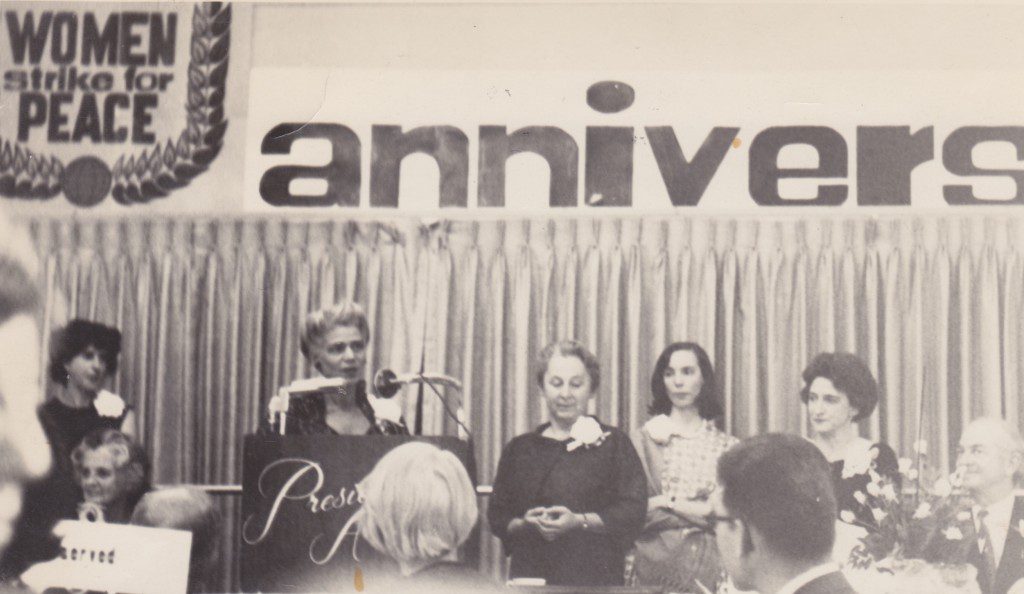
Donna Takes On HUAC
On November 19, 1964, Donna, along with Dagmar Wilson, and Russ Nixon, general manager of the National Guardian in New York, received subpoenas to testify before the House Un-American Activities Committee (HUAC) in Executive Session. They were to be questioned in secret in connection with visits they had made to the State Department in 1963 to urge that an entry permit be granted to a Japanese peace movement leader who was scheduled to give a 10-day lecture tour in the United States. The State Department in fact granted his request for a visa.
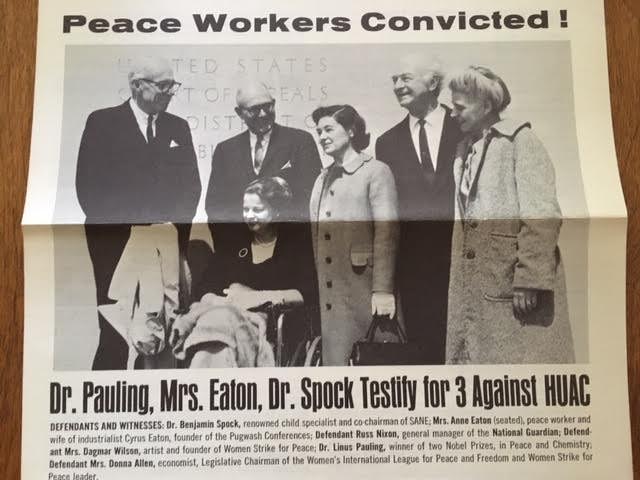
All three refused to testify before HUAC in secret session and demanded that the press and public be admitted to the hearing room. At a meeting of four HUAC members, the committee refused to grant open hearings and later voted to recommend contempt citations. Donna Allen, Dagmar Wilson, and Russ Nixon were cited for contempt of Congress, tried in federal court on April 7, 1965, and convicted and sentenced on June 4. In early December 1965, Donna began working as the Washington Representative for the National Committee to Abolish HUAC.
A support group of prominent Americans was established called Defenders of Three Against HUAC. Several members of the group testified at their trial. After much publicity, speaking tours, and media appearances, the conviction was overturned in the Court of Appeals on August 2, 1966.
Donna’s work in Washington with the National Committee to Abolish HUAC was a key factor in the abolition of HUAC in 1975.
National Leader for Peace and Justice
In 1965, combining her commitment to civil rights and her opposition to the war in Vietnam, Donna wrote, published, and distributed thousands of copies of a publication entitled What’s Wrong With the War in Vietnam.
Donna had become a national leader in the anti-war movement. She traveled across the country several times speaking in numerous cities. She regularly spoke at rallies on the East coast. In 1965, for example, she addressed the Vietnam Peace Parade in New York City and a 1966 rally in Philadelphia. In July 1967, she was featured at an all-day peace workshop for women in the gardens of Dr. Linus and Ava Helen Pauling in California. Malvina Reynolds, a Berkeley-based internationally known composer, guitarist, and singer of peace songs, performed at the program. In May 1969, Donna, Julian Bond, and others spoke at a rally for peace and justice in Pittsburgh.
Donna took part in many joint efforts on behalf of peace and justice issues. In August 1965, she was one of 31 individuals who called for and organized the Assembly of Unrepresented People. She was active with the International Days of Protest, Mobilization to end the War in Vietnam, the Fort Hood Three, Vietnam Summer, Tri-Continental Information Center and the October 21, 1967, demonstration at the Pentagon. Donna was an organizer for the Jeannette Rankin Brigade, held in January 1968, and in June 1968 for the Poor People’s Campaign. She worked with the civil rights movement in its efforts to win political recognition for blacks in state and national electoral politics.
Increasing Emphasis on Media Democracy
From 1967 onward, Donna focused increasingly on media democracy issues. Newly elected to the Board of Directors of the National Conference for New Politics, Donna spoke at its major convention in Chicago in September 1967. Several thousand people attended this convention. Donna gave her talk on the issue of the media. A photo of her on the speaker’s platform with Dr. Benjamin Spock, Reverend William Sloan Coffin, Jr. and Dick Gregory, appears in Gregory’s book Write Me In!, published in 1968 when he ran for president as a write-in candidate.

From then on her speeches were all focused on the role of mass media. She gave media-related speeches at peace demonstrations in Washington, the Jeannette Rankin Brigade in January 1968, and at the Peace and Freedom Party convention in New York in 1968. “I had come to the conclusion,” she wrote, “that even when using all forms of communication that we could devise, and despite great numbers, we still could not match the number of people that the relatively few mass media owners could reach with their information and opinions.
“It was more than clear to me out of my experience that their vastly superior ability to reach the majority of the public 24-hours a day gave them the power to disseminate name-calling and successfully persuade the public not to listen to our information, opinions and facts. Their news stories gave little or no space to the message our activities were trying to convey but a great deal of space for attacks on us … Mechanics of demonstrations, numbers of people, police actions, were reported but not our message. These media were not ‘our free press’; they did not speak for us or report our news. Our press conferences were usually ignored, and when they weren’t the coverage was often derogatory.”
In July 1968, Donna published an article in The Liberated Voice, Syracuse, NY, entitled “Up Against the Media. In this article she critiqued the media, discussing its concentration in the hands of a few and its effect on democracy. Donna documented the concentration of ownership in print, radio, television, and in the news services. She wrote about how the mass media silenced criticism of the status quo and of U.S. policies.
On May 24, 1969, Donna gave a speech titled “The Mass Media Monopoly” at the March and Rally for Peace and Justice in Pittsburgh. Donna talked about the consolidation of media ownership in fewer and wealthier hands. She described the history of the press in America. She discussed how profitable media ownership is and how the media networks own other businesses, including those with war contracts. “At what point will we begin to do something about it?” she asked. “I suggest that the time is now.”
The Southern Conference Educational Fund reprinted her “Mass Media Monopoly” speech entitled “So You Think You Have a Free Press?” The pamphlet was published in January 1970 when one of Donna’s daughters was jailed on a free press case while active in the southern civil rights movement.

In 1968 Donna organized a media group called American’s for Equal Access to the Media. She had to take time out to revise her book on fringe benefits for a second edition and the group was not strong enough to survive without her attention. In the meantime she had done more thinking and, by early 1972, she knew that the organization that was needed would have “women” in the title. Experience told her that it would be primarily women who would expand freedom of the press to those who did not have it. Most men resisted the ideas she discussed and tried to argue with her. Women, on the other hand, responded enthusiastically, and seemed to understand the need for people to be able to speak for themselves, rather than have others portray them. Donna also chose to omit the word access in the name because she did not want to imply in any way that the solution to lack of media democracy is access to anyone else’s media. In 1972, WIFP was born.
Women’s Institute for Freedom of the Press
While working to abolish HUAC, Donna had enrolled at Howard University in Washington, DC. In 1971, she added a Ph.D. in history to her M.A. in economics. By 1972 she was ready to embark on her life’s work fighting for media democracy, the work of the WIFP. Eager to let others know “what women are doing and thinking about the communications media,” she immediately began publishing Media Report to Women.
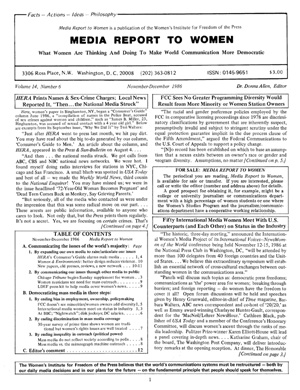
In addition to the monthly report, WIFP published other publications including Women in Media: A Documentary Source Book, and an annual Directory of Women’s Media. Donna also collaborated with other women to write books in the field of communications.
Donna and WIFP organized a series of annual conferences with ambitious goals to increase communications among women. The seven conferences were titled the Annual Conference for Planning a National and International Communications System for Women. The first six of these were held at the National Press Club in Washington, DC, which had just admitted women to membership.

Each year the attendance at the conferences grew. The 1982 conference was attended by 124 women from 32 countries. These conferences stimulated ideas abou what needed to be done to increase communication among women and bring women’s voices to the public. Many projects were born, including some using sophisticated technology to communicate women’s messages.
In 1980 at the annual conference, Donna and WIFP launched one of the most ambitious communication technology projects, a satellite teleconference. This 4-hour international interactive teleconference by satellite between the Second United Nations World Conference on Women in Copenhagen, Denmark, was an historic event. Five years later, during the United Nations World Conference on Women in Nairobi, Kenya, WIFP organized the satellite teleconferences again, this time including several other countries.
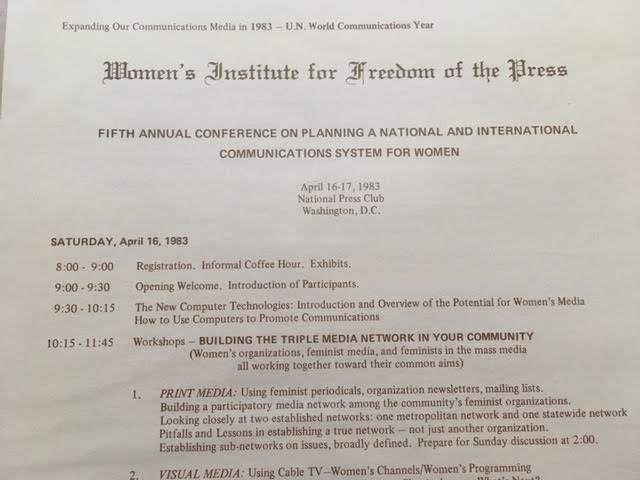
As a result of her work over the years she received recognition from many groups. For example, in 1979 Donna won the Headliner Award, the highest award bestowed by Women in Communications. Inc. At the 28th annual Broadcast Industry Conference meeting in San Francisco in 1980, Donna received the Broadcast Preceptor Award for leadership in extending First Amendment guarantees to women. In 1983 she won the Wonder Woman Award from the Wonder Woman Foundation.

Donna worked tirelessly to develop her ideas and philosophy on the creation of a democratic communications system. Her media philosophy contains many straightforward ideas that can be applied to analyze how we might get closer to media democracy. One such issue is the importance of people being able to communicate their information directly to others without having to request inclusion in someone else’s media. Although equality of outreach is also an important issue, without being able to communicate your message directly, distortions and inaccuracies will continue to occur. She was an advocate for women utilizing electronic media in the early days of the Internet.
Donna always believed strongly that working on democratic media issues is necessary to bring about the changes that she felt are needed in the world. The WIFP continues to utilize her ideas of how we head toward a democratic media system and to share this media philosophy with others in this endeavor.

To get all the things done that she envisioned, Donna rose at 4 am and was active until 10 pm. She loved the early hours because she was able to get so much accomplished before the phone started ringing and the day’s activities began.
Say Her Name
Black women have experienced violence to a heartbreaking degree since they were brought to these shores. Police, in particular, continue to get away with violence and outright murder to this day. Much of the time the coverage of police killings by media is distorted or they simply give little or no coverage.
There is a movement to change this: expose the injustices, hold those accountable, and confront the systemic racism and patriarchy that perpetuates the murder of black women. Kimberlé Crenshaw, Co-founder and Executive Director of African American Policy Forum (AAPF), Professor of Law, Columbia and UCLA, has spearheaded this movement with the hashtag #Say Her Name. If you haven’t already explored the wonderful work they are doing, we urge you to do so. The information shared here is from the webinars and inspirational work they have been doing over the years.
Photos are from a moving vigil “Say Their Names” for Black Womxn, held June 21, 2020 on the Duke Ellington Bridge in Washington, DC., thanks to Freedom Fighters DC.
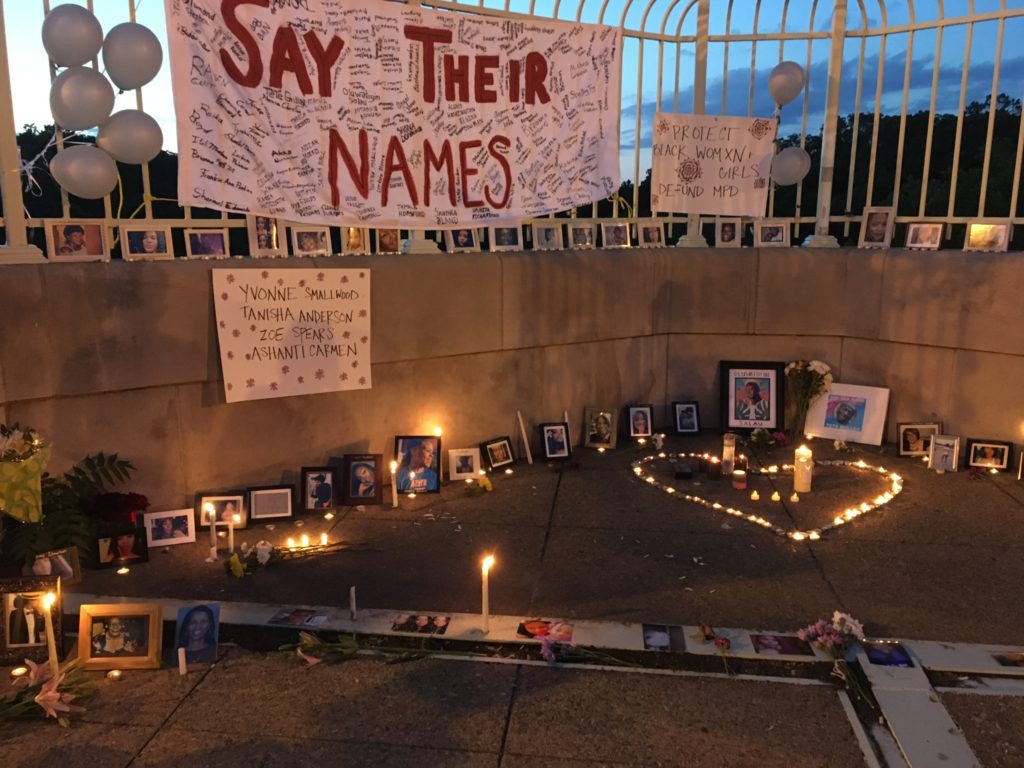
Below are the names of some of the black women who have been murdered by law enforcement. Almost none of the police officers have had to face any consequence for their actions. Almost all the women killed were unarmed. Some were experiencing mental health issues. Instead of being helped, they were shot.
The media reported police justifications for their shooting. In many cases, neither the women nor their families had a voice, particularly in the initial reports that were all that the public heard. The distorted narrative could not be corrected and media headlines often, perhaps inadvertently, summed up the lives of these women in distorted ways. For instance, a headline using the term “shoplifter” or even “suspected shoplifter” implies this somehow contributes to the justification for killing her. In one case, she was no threat, unarmed in her car with her child. To sum up her life in that manner not only affects all that read this narrative. It will affect her children who grow up to read about “why” their mother died. And it puts the blame on the woman rather than the killer, painful to the family. Not only do they lose a beloved mother, daughter, granddaughter, sister, aunt – they see the killer get away with the murder. The killer is almost always not charged at all. Nor do they lose their jobs and can go on to continue violent behavior.
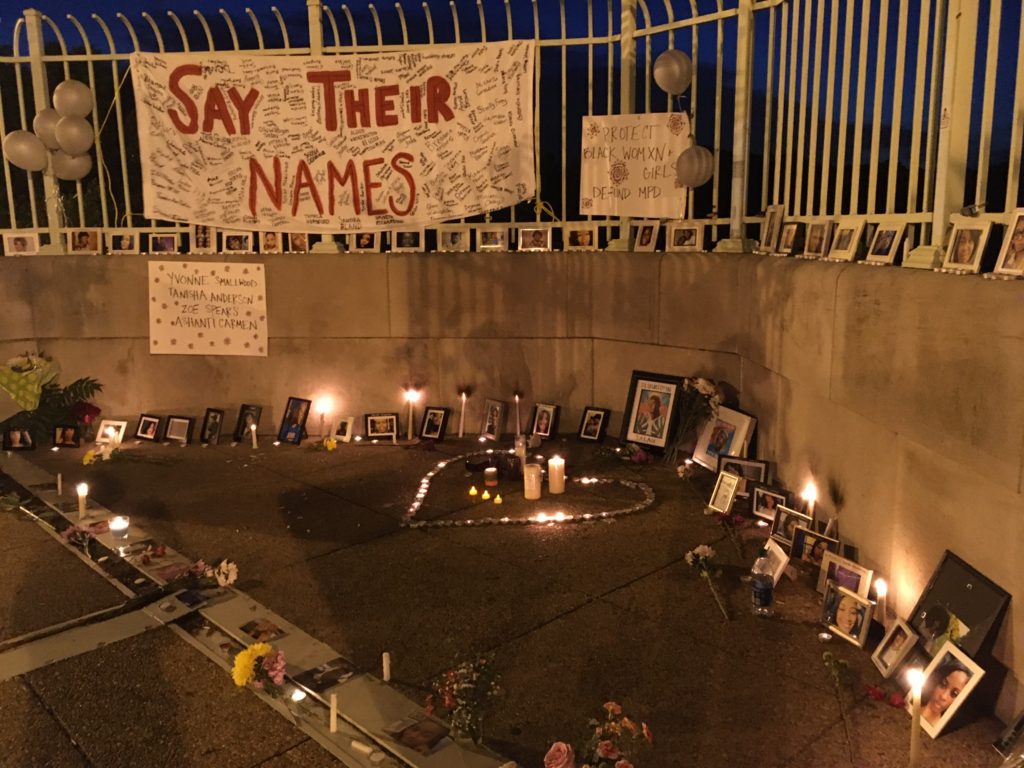
Fortunately a movement has grown to #SayHerName. More people speaking out on behalf of the murdered women. Sandra Bland’s murder in 2015 in particular brought attention to the experience of black women, as has Breonna Taylor’s this year.
We must hold the media reporting of the killings accountable when they simply report the police justifications for their killing. We must not let the media, in headlines or in their stories, lend credence to justifications by focusing on what the murdered black woman (or black man) are alleged to have done when those nonviolent actions alleged in no way can justify being shot. The narrative matters.
These are just some of the many black women shot by police and killed in police custody. When you learn about the lives of these women, their hopes and dreams cut short, see photos of them graduating school or with their children and families, it is even more heartbreaking and will inspire you to speak out. Their stories are not told in this article but you can hear about many of them from the AAPF and #SayHerName movement. You can also go to the media to search and will see much of the distortions. Killings caught on camera often show much of the injustice. Stopped for a traffic violation and ending up dead speaks for itself. In many cases ending up shot for not doing ANYTHING that can be construed as wrong, as in the Breonna Taylor case, still resulted in police not facing charges.
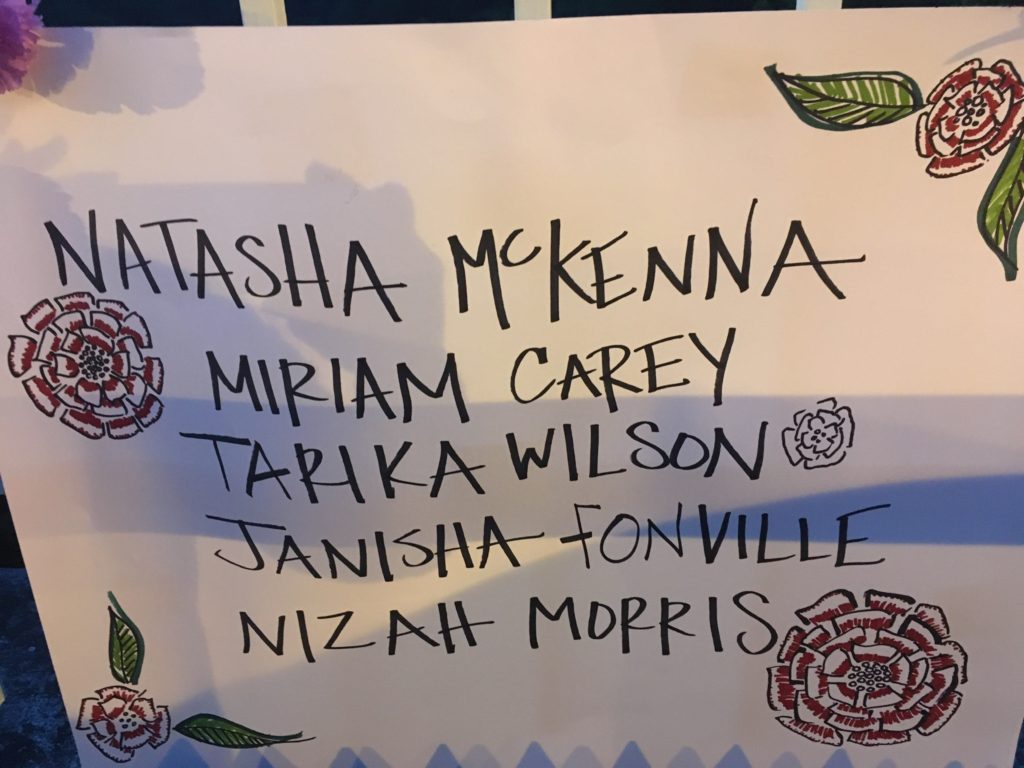
We at WIFP are motivated in our media democracy and media justice work in part because of all the violence against women over the decades, and the violence against black women and women of color is particularly horrendous. We are at an important moment when we can get closer to the justice we so desperately need.
Say Her Name (this list is just some of known black women killed)
2020
Breonna Taylor – 26 years old – Louisville, KY – March 13
2019
Pamela Shantay Turner – 44 years old – Baytown, TX – May 13
2017
Morgan London Rankins – 30 years old – Austin, TX – February 22
Charleena Lyles – 30 years old – Seattle, WA – June 18
2016
Bynnya McMillen – 16 years old – Elizabethtown, KY – January 11
Kisha Michael – 31 years old – Inglewood, CA – February 21
India Beaty – 25 years old – Norfolk, VA – March 19
Symone Marshall – 22 years old – Huntsville, TX – May 10
Jessica Williams – 29 years old – San Francisco, CA – May 19
Korryn Gaines – 23 years old – Baltimore, MD – August 1
2015
Natasha McKenna – 37 years old – Fairfax, VA – February 8
Janisha Fonville – 20 years old – Charlotte, NC – February 18, 2015
Meagan Hockaday – 26 years old – Oxnard, CA – March 28
Mya Hall – 27 years – Baltimore, MD – March 30
Alexia Christian – 26 years old – Atlanta, GA – April 30
Sandra Bland – 28 years – Waller County, TX – July 13
Joyce Curnell – 50 years old – Charleston, SC – July 22
Ralkina Jones – 37 years old – Cleveland, OH – July 26
India Kager – 27 years – Virginia Beach, VA – September 5
2014
Yvette Smith – 47 years old – Bastrop County, TX – February 16
Gabriella Nevarez – 22 years old – Sacramento, CA – March 2
Pearlie Golden – 93 years old – Hearne, TX – May 7
Michelle Cusseaux – 50 years old – Phoenix, AZ – August 13
Sheneque Proctor – 18 years old – Bessemer, AL – November 1
Aura Rosser – 40 years old – Ann Arbor, MI – November 9
Tanisha Anderson – 37 years old – Cleveland, OH – November 13
2013
Kayla Moore – 42 years old – Berkeley, CA – February 12
Kyam Livingston – 37 years old – Brooklyn, NY
Mirian Carey – 34 years old – Washington, DC
2012
Rekia Boyd – 22 years old – Chicago, IL – March 21
Shantel Davis – 23 years old – Brooklyn, NY – June 14
Shelly Frey – 27 years old – Houston, TX – December 6
2010
Ahjah Dixon – 23 years old – Corsica, TX – March 4
Aiyanna Stanley Jones – 7 years old – Detroit, MI – May 16
2008
Tarika Wilson – 26 years old – Lima, OH – January 4
2006
Kathryn Johnston – 92 years old – Atlanta, GA – November 21
2003
Kendra James – 21 years old – Portland, OR – May 5
Alberta Spruill – 57 years old – Harlem, NY – May 16
1984
Eleanor Bumpurs – 66 years old – Bronx, NY October 29

Progressive Media
Progressive Media: News & Perspectives Rarely Found in Corporate Media
Just five corporate conglomerates control over 90% of the media in the United States. They control the narratives in print, radio, publishing, film, and all forms of media. These corporate media normalize and promote war & imperialism, militarism, capitalism, the 2-party system, poverty, the control of the 1% that keep us from implementing democracy, animal factory farming, and all kinds of injustices. They do not seriously tackle and expose violence against women and people of color. Hiring more women and people of color in corporate media is necessary but cannot affect the change necessary to halt climate change, eradicate systemic racism and patriarchy, and end the injustices that are still so rampant. While we appreciate the voices that do get heard occasionally, we cannot expect those few voices to be sufficient when it is surrounded by misinformation, omissions, distortions, and normalizing narratives.
There are creative and outstanding voices providing the visions and information so lacking within the corporate media environment.
Here are just a few.
· Abby Martin (Host and Producer of Empire Files, Host of Media Roots Radio)
· Anya Parampil (Red Lines, The Greyzone)
· Medea Benjamin (Code Pink – books, articles, radio, and more!)
· Sonali Kolhatkar (Rising Up With Sonali)
· Amy Goodman (Democracy Now!)
· Laura Flanders (The Laura Flanders Show)
· Eleanor Goldfield (Act Out! and more)
· Ester Iverem (On The Ground – www.wpfwfm.org)
· Alina Duarte (independent global media reporter and photographer)
· Margaret Kimberley (Editor and Senior Columnist for Black Agenda Report)
· Margaret Flowers (Popular Resistance & Clearing the Fog)
· Hiba Yazbeck (Haaretz)
· Ann Wright (Code Pink)
· Films for Action (www.filmsforaction.org)
· The Greyzone (www.thegreyzone.com) with Max Blumenthal
· Council on Hemispheric Affairs (coha.org)
· Common Dreams (commondreams.org)
· MintPress News
· FAIR (Fairness and Accuracy in Reporting (@FAIR media watch)
· Intercept
· Truthdig
· The Nation
· Loud and Clear
· Redacted Tonight (Lee Camp)
· Common Censored
· By Any Means Necessary (Jacqueline Luqman, Sean Blackmon)
· Venezuelan Analysis
· Consortium News
· Alliance for Global Justice (www.AFGJ.org
· BreakThroughNews.org (Monica Cruz and Eugene Puryear)
· Jacqueline Luqman (Co-host of “By Any Means Necessary” on Sputnik Radio)
· Telesur TV (www.telesurtv.net)
· Orinoco Tribune (www.orinocotribune.com)
· Leonardo Flores (Code Pink)
· Here to Slay (weekly podcast on Luminary with Roxane Gay and Dr. Tressie McMillan Cottom)
· Project Censored
· Women’s Media (hundreds listed in WIFP’s annual issues of the Directory of Women’s Media (1975-2017)
· WINGS: Women’s International News Gathering Service (wings.org)
· Women Make Movies (wmm.com)
· Jennifer Pozner (feminist media critic, author and speaker)
· Ariel Dougherty (film maker, feminist media advocate and activist)
· Margaret Kimberley (Editor and Senior Columnist for Black Agenda Report)
· The Real News Network
· theAnalysis.news with Paul Jay and Sharmini Peries
· Films for Action (https://www.filmsforaction.org/)
WIFP Denounces Repression in Bolivia
We, the undersigned US organizations condemn the civic-military coup in Bolivia and the brutal repression unleashed by the police and military authorized by the self-proclaimed anti-Indigenous “President” of Bolivia, Senator Jeanine Áñez.
The regime has burned the Wiphala, flag of the Indigenous nations of Bolivia; decreed an exemption to prosecution for the police and military for the use of lethal force against demonstrators; and has criminalized democratically elected officials and rank and file members of organizations associated with the deposed government. These decrees led to the massacre in Cochabamba on November 15 in which police and the armed forces opened fire on demonstrators killing five people and wounding more than 100, as well as the massacre of Senkata on November 19 in which at least 8 people were killed and at least 30 wounded. They have also led to the deployment of military, police and private intelligence agencies to hunt down and arrest political opponents of the coup regime.
We urge an immediate investigation by the UN of the killing of at least 32 people and the wounding of more than 700 by the police and security forces since the coup against President Evo Morales on November 10, 2019, based on official data from the Office of the People’s Defender (“Defensoría del Pueblo”). We also call for the release of all political detainees.
We support calls by the constitutional President, Evo Morales as well as the United Nations, for dialogue to avoid further bloodshed. We call for the return of security forces to the barracks and an investigation into the crimes committed by the police and military, as well as those who authorized the use of lethal force, to hold perpetrators accountable.
We also reject the illegal self-proclamation as “President” of Senator Jeanine Áñez, elected without a quorum and without the presence of MAS members of congress, whose safety is under permanent threat. This self-proclamation also violates article 161 of the Bolivian Constitution, according to which Congress must accept the President’s resignation in order for it to be valid, which so far hasn’t taken place.
We urge the US Congress and the Organization of American States (OAS) to condemn the coup against the constitutional government and support the path of dialogue over escalating confrontation.
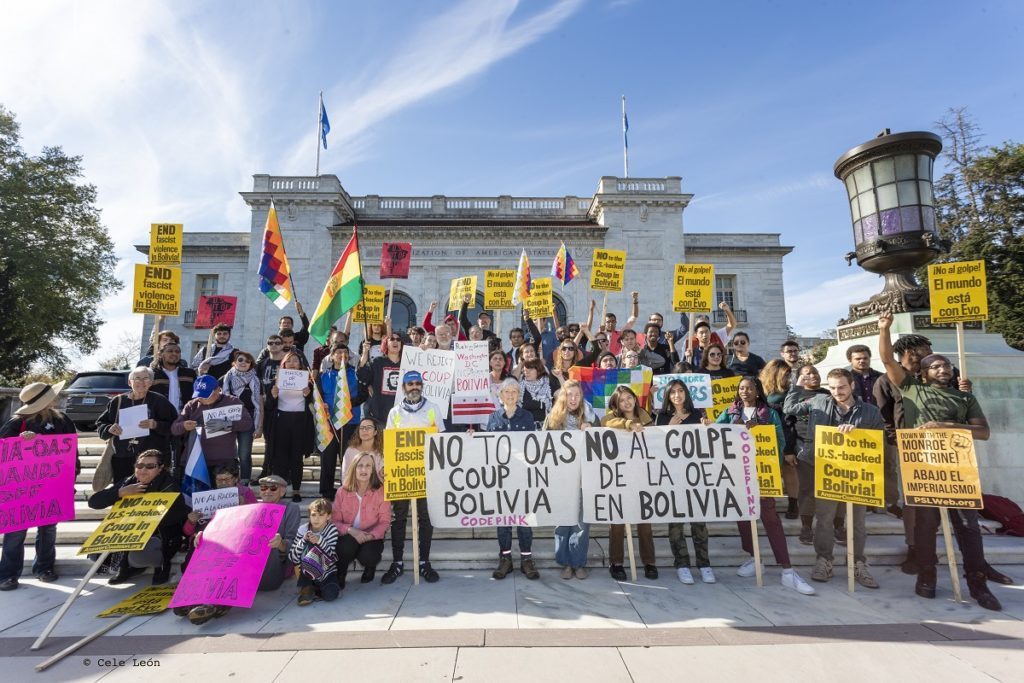
(Photo-Credit: Cele León)
WE DEMAND AN IMMEDIATE END TO THE KILLING OF INDIGENOUS BOLIVIANS!
PEACE FOR BOLIVIA!
SIGNATURES
- Forum of Sao Paulo, Executive Committee in Washington DC, Maryland and Virginia
- CODEPINK, USA
- ANSWER Coalition, USA
- Democratic Socialists of America, Richmond, Virginia chapter
- Socialist Unity Party, USA
- International Committee for Peace, Justice and Dignity, USA
- Friends of the Congo, Washington DC
- National Network on Cuba, USA
- Popular Resistance, Washington DC
- Party for Socialism and Liberation, Washington DC
- Black Alliance for Peace, Washington DC
- Women’s Institute for Freedom of the Press, Washington, DC
- Communist Party, USA
- Central Committee of the Peace and Freedom Party of California, San Diego, California
- Council on Hemispheric Affairs, COHA, Washington DC
- Peace Council, Greater New Haven, Connecticut
- Red Nacional de Salvadoreños en el Exterior, RENASE, USA
- Carolina Peace Resource Center, South Carolina
- Leonard Peltier Defense Committee, San Diego, California
- Congreso de los Pueblos, Colombia, international committee in DC
- FigTree Foundation, USA,
- Comité de Salvadoreños en Washington DC
- Friends of Latin America, Columbia, Maryland
- Rutilio House, Takoma Park, Maryland
- Committee Against Police Brutality, San Diego, California
- Women in Struggle, Washington DC
- Committee in Solidarity with the People of El Salvador, CISPES, Washington DC
- International Womxns Alliance-DC (DIWA)
- Comité del FMLN de Washington DC
- All-African People’s Revolutionary Party (GC), Washington, DC
- World Development Alliance, South Carolina
2019 Activist Salon
Artist and performer Luci Murphy received WIFP’s Women and Media Award at the 2019 Activist Salon on July 17th.
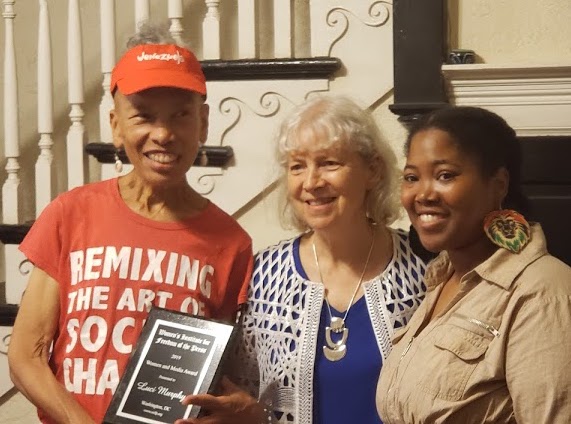
Luci Murphy is a preeminent advocate for utilizing culture to advance social and political justice, weaving people together across communities. As an artist and performer, she has harnessed her musical talents by singing for social justice, civil rights, union rights, affordable housing, peace, and other causes. (See the Women and Media Award page on this website for more about Luci’s important work and contributions.)
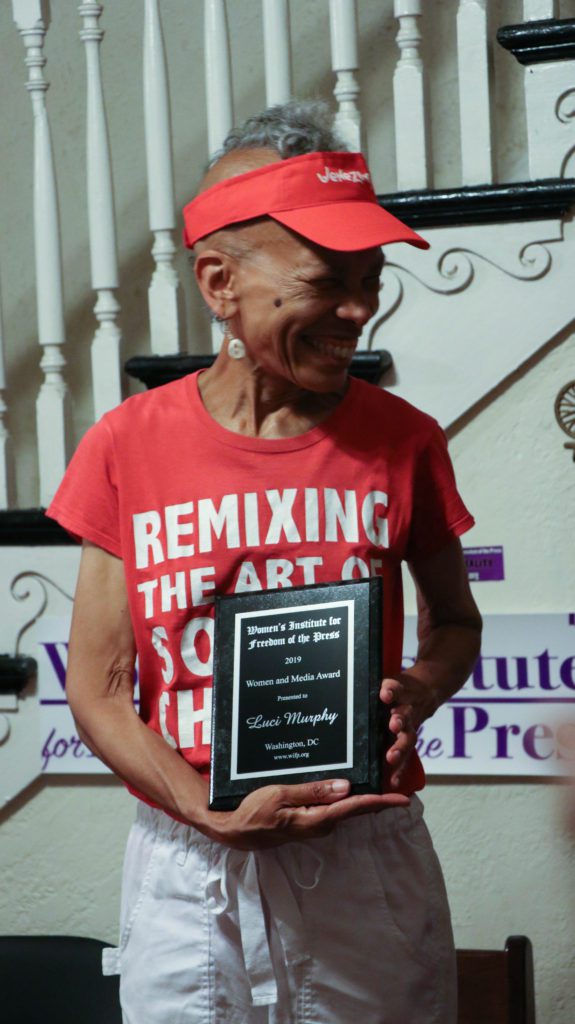
WIFP Director Martha Allen welcomed participants to the 2019 Activist Salon.
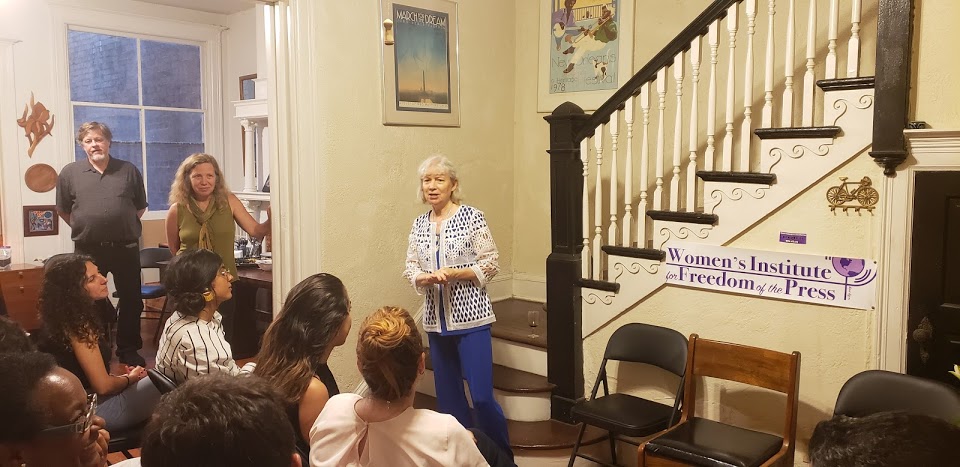
Short interesting presentations by speakers stimulated discussions and led to networking and connecting among the activists.
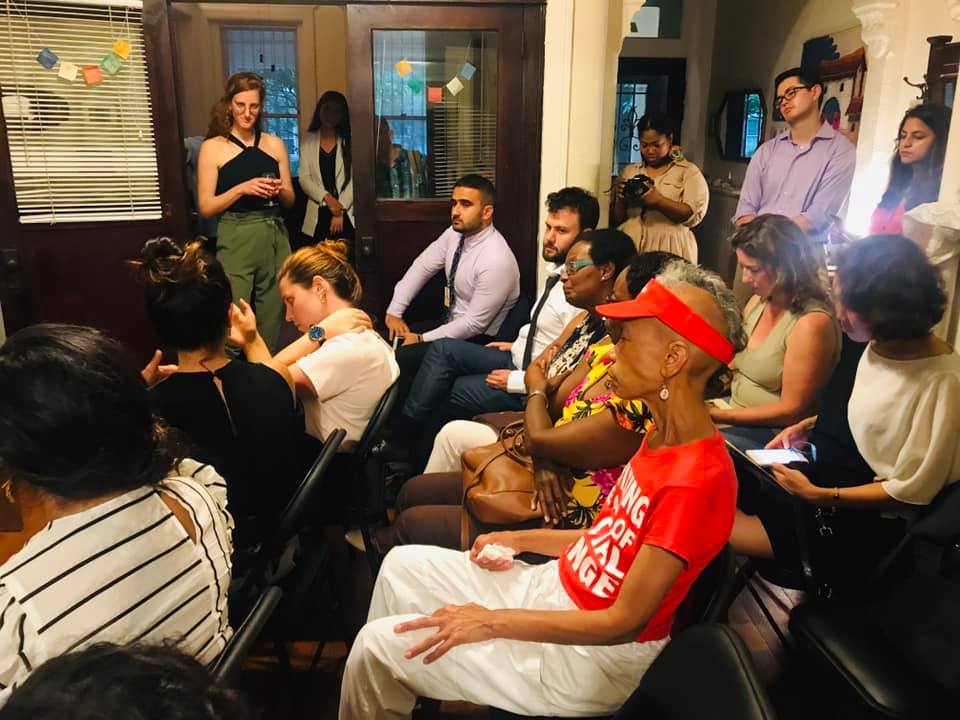
New Story Leadership for the Middle East (NSL) Managing Directors Rawan Odeh and Anna Garbar interviewed three of their 2019 delegates about their lives and their work.
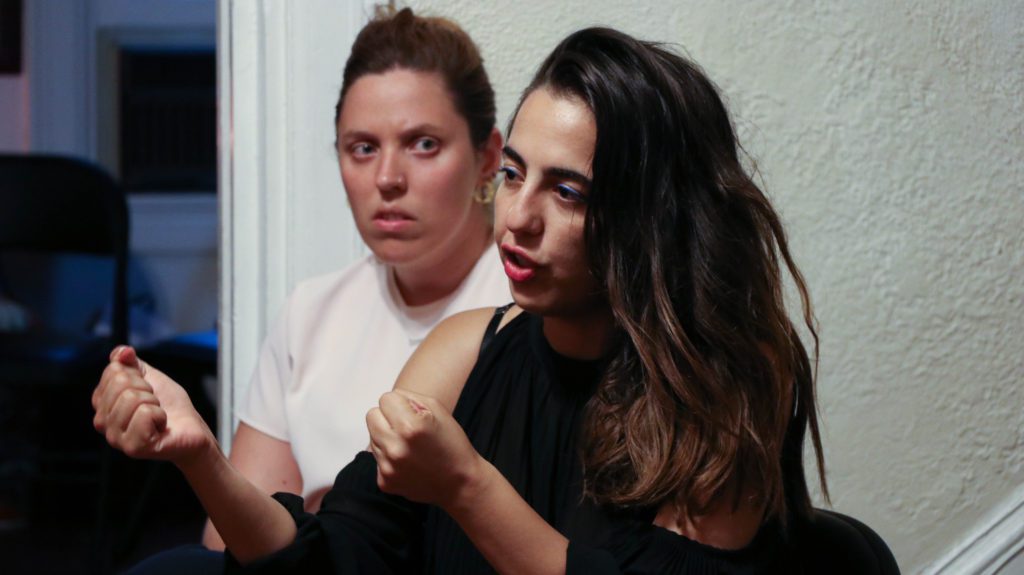
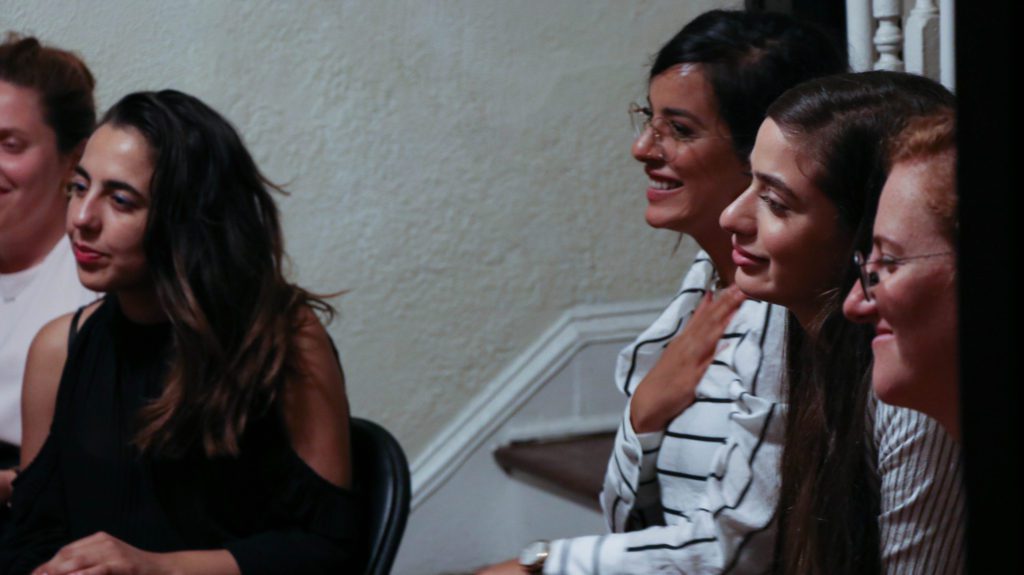
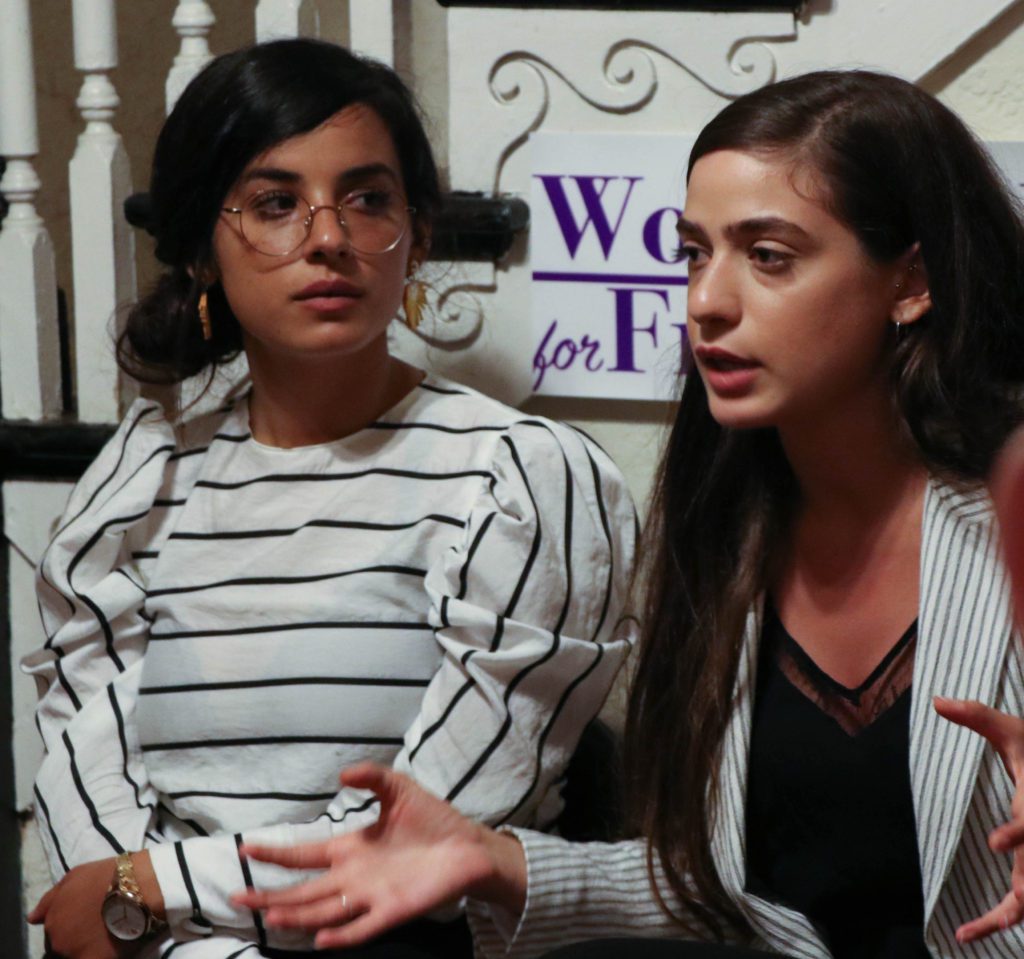
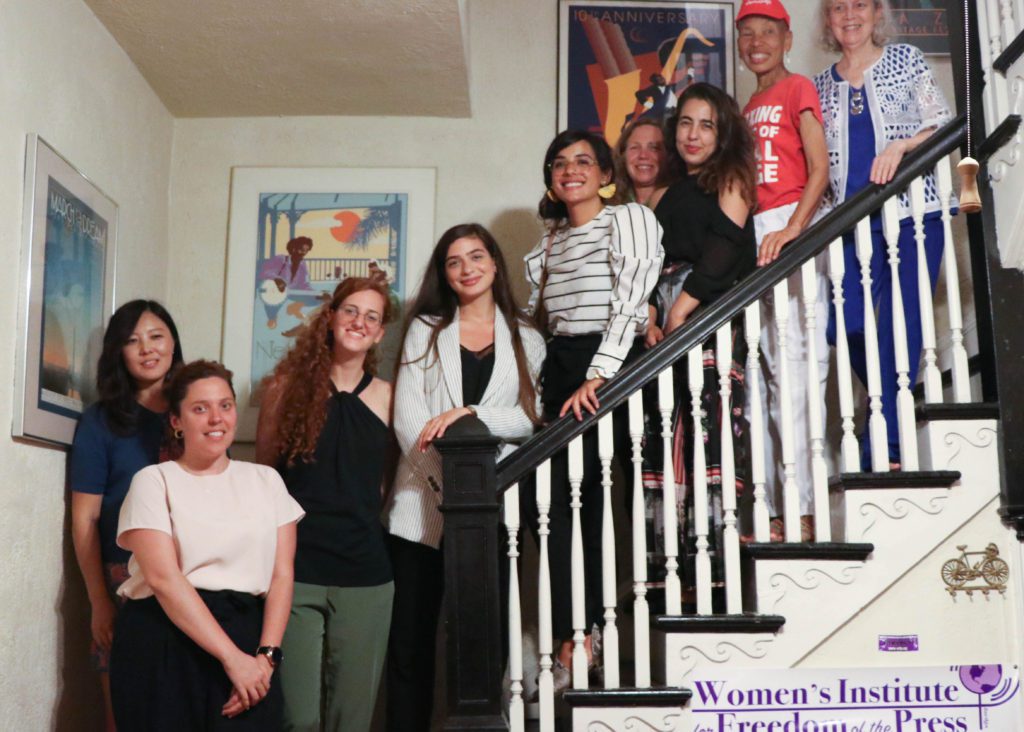
Rawan Odeh is a Palestinian American who lived half her life in New York and half in Nablus. Rawan has worked as an Asset Management Associate for Women’s World Banking in the MENA region. Afterwards, she went on a fellowship with Kings College London and published research on the Economic Aspects of the Palestinian Israeli Conflict.
Anna Garber is an Israeli from Haifa. She holds a B.A. in Political Science and Philosophy at the University of Haifa and is currently pursuing her Masters in International Relations at American University. She has worked at the Institute of International Education.
Rawan and Anna interviewed two Palestinian women and an Israeli leading to discussions with the activist audience. Brief backgrounds of the women who spoke:
Hiba Yazbeck: Palestinian citizen of Israel, born in Nazareth. In communications at Tel Aviv University. Currently interning at Haaretz. Hiba is working in the office with Rep. Rashida Tlaib.
Thawra Abukhdier: Palestinian American from Jerusalem. She holds a Bachelor of Science in Communications and Journalism from Hebrew University. Thawra is working in the office with Rep. Alexandria Ocasio-Cortez.
Dana Amir: Dana is from Gan-New, Israel. The past five years she has been traveling and studying around the world. She is currently pursuing a B.A. degree in Psychology and Economics. Dana is working on a Project for Change where international students learn to recognize and mitigate cognitive and emotional biases that appear in complex and difficult political discussions.
In addition to the speakers on the Middle East, Margaret Flowers spoke about the work of activists in the U.S. on a number of important issues including single payer health care and the importance of activist journalists efforts to get information out that is omitted or distorted by the corporate-owned mass media. Margaret Flowers is a Pediatrician and advocate for single payer health care and justice. She is the co-director of Popular Resistance and co-host of Clearing the Fog, a weekly podcast.
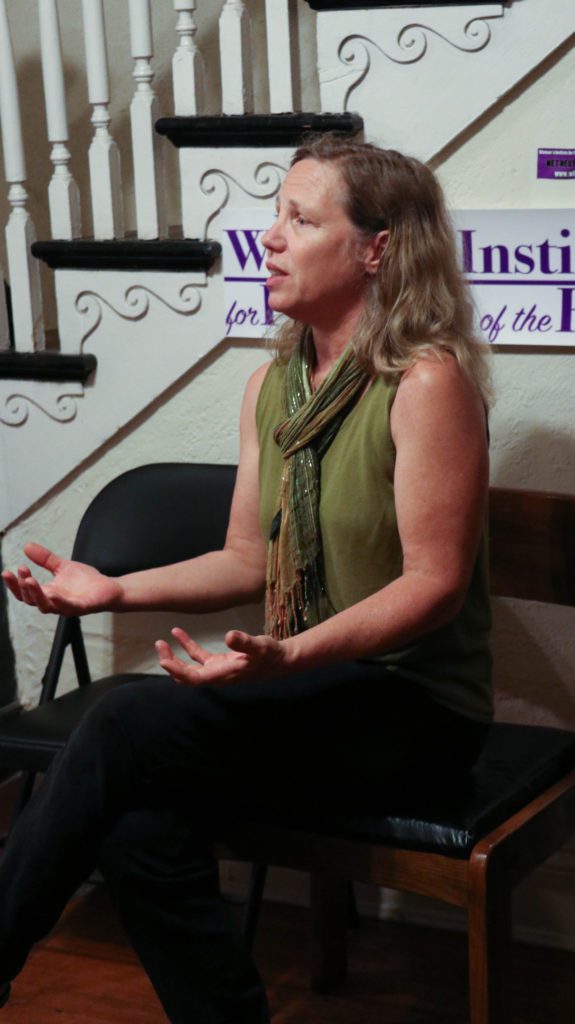
Hosts of the WIFP event were Martha Allen (WIFP director), Tanya Smith-Sreen, Otgon Altankhuyag, Alethea Russell, Arya Boris, and Jonathan Zeitlin — all Associates of WIFP and support staff. Alethea Russell, a photographer, provided most of these wonderful photos from the event.
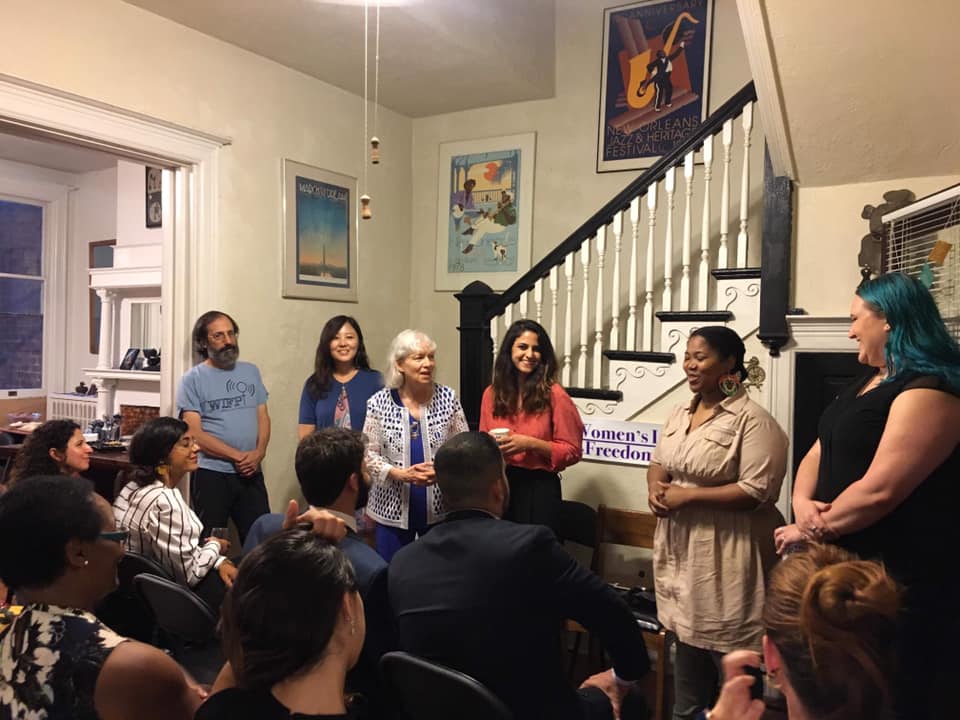
Organizational links
New Story Leadership for the Middle East (NSL): www.newstoryleadership.org
Popular Resistance: www.popularresistance.org
 The Women’s Institute for Freedom of the Press
The Women’s Institute for Freedom of the Press